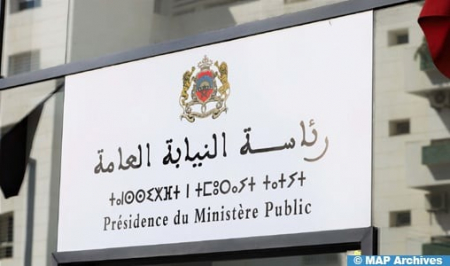This statement follows that of the Délégation Générale à l’Administration Pénitentiaire et à la Réinsertion (DGAPR) on 7 August, which highlighted the situation of prisons and the increase in the number of prisoners, with the consequent overcrowding due to higher rates of detention.
In the context of the right of access to information enshrined in the Constitution and the law, the Public Prosecutor’s Office wishes to provide the public with certain clarifications on the factors and constraints that influence the number of prison inmates.
According to the same source, the qualitative evolution of crime in recent years, whether in terms of the seriousness of the acts committed, the means used or the nature of the perpetrators, especially repeat offenders, with its consequences for the peace of mind of citizens and society, has forced those responsible for law enforcement to deal with all these phenomena in order to ensure the safety of people and protect their property.
In this context, the security services and the judicial police are making and continue to make tireless efforts to apprehend outlaws and bring them before the competent prosecutor’s office, the statement added, noting that their number stood at 309 in the first half of 2023. The majority of these 259 people were prosecuted for drug trafficking, hooliganism and financial crimes related to the fight against financial evasion, as well as gang-related assaults, robberies and other serious crimes.
In the first half of 2023, 162,545 persons were arrested on the basis of national wanted notices and referred to the relevant prosecution offices for appropriate legal action.
Similarly, prosecutors’ offices ensured the execution of prison sentences handed down against convicts at large, the statement said, noting that the judicial police had made remarkable efforts to arrest convicts and place them in the relevant prisons.
This was also the case for a number of persons who were subject to restraining orders for non-payment of fines and public or private debts owed to them in accordance with the law. “There is therefore no doubt that these factors have contributed to an increase in the prison population,” the Prosecutor’s Office said.
Since one of the priorities of criminal policy is to guarantee the safety and security of all members of society, their rights and their physical integrity, the Office of the Public Prosecutor, as the authority responsible for its implementation, has worked to encourage the Public Prosecutor’s Offices to deal responsibly with persons accused of dangerous acts, reconciling the protection of citizens and their property with the preservation of the rights and freedoms of the accused, taking into account the capacity of the penitentiary system.
In accordance with this policy and aware of the need to rationalize the management of detention, the Public Prosecutor’s Office has taken care to resort to detention only when necessary, as evidenced by the detention rate, which did not exceed 24% of the total number of persons referred to it (309,259 persons) in the first half of the current year, a reasonable rate compared with the high rates recorded in other countries, according to the statement.
On the basis of the above, the number of pretrial detainees in prisons decreased to 39% by July 2023, compared to 40% in the same period of the previous year, and in contrast to the rates recorded since 2010, which varied between 38% and 47%. This percentage had reached 43% in 2010 and 47% in 2011, showing that prison management is keeping pace with crime trends.
Although the percentages recorded for preventive detention rates do not meet the objectives of the Presidency of the Public Prosecutor’s Office, despite the efforts made in this area, they remain acceptable in comparison with preventive detention rates in some European Union countries, according to figures published by the Council of Europe for the year 2022, in particular in the Netherlands (45.2%), Belgium (38.4%), France (28.5%), Italy (31.5%), Denmark (41.3%) and Luxembourg (43.3%), notes the statement.
Despite the decrease in the detention rate during the first half of this year and the efforts made by prosecutors to rationalize preventive detention, various social actors have continued to call for the activation of the detention mechanism to deter the perpetrators of minor crimes, instead of prosecuting them at liberty, through numerous media, including social networks and others, in the belief that justice and repression can only be effective through detention and imprisonment.
Nevertheless, the judges of the Public Prosecutor’s Office remain committed to the strict application of the law and are in no way influenced by what has been said, since they tend to rationalize the management of the detention procedure for the majority of the persons brought before them, in accordance with the principle of adaptation, as do the investigating judges within the framework of their discretion and independence.
The Office of the Public Prosecutor points out that, thanks to the positive interaction with the central services of the judicial police in order to improve the efficiency of the judiciary by rationalizing the completion of criminal investigations within a reasonable time, most of these investigations are now completed within a maximum of three months.
It also notes that most of the persons concerned by these investigations are referred to the competent public prosecutor’s offices, which decide to place some of them in preventive detention when the necessary conditions are met, in particular the seriousness of the acts and the lack of guarantees, as is the case, for example, with the issuing of NSF cheques, fraud, forgery, trafficking in persons and others.
Regarding the prison population in 2022, the same source indicates that 30% will be imprisoned for drug trafficking, 31% for financial crimes, and 30% for serious assaults on individuals (homicide, formation of criminal gangs, use of bladed weapons, etc.).
The statement goes on to say that criminal cases before the courts account for almost 62% of the total number of cases pending in these jurisdictions, explaining that judges are making enormous efforts to deal with them within a reasonable timeframe, despite the constraints related to legal and factual aspects, particularly the issue of notification, as evidenced by the rate of criminal cases judged in 2022 (87%), which means that the number of judgments issued by each judge exceeds 2,000 due to the shortage of judges in general, knowing that this average exceeds that recorded in some countries.
The Presidency of the Public Prosecutor’s Office also affirms that its priority is to combat the proliferation of crime and to protect citizens and society from its effects, based on the State’s commitments in this area, with the aim of avoiding undermining the crime-fighting efforts of the Security Services and the Judicial Police, and to enshrine the role of the judiciary in implementing the principle of protecting the rights of individuals and groups, their freedom and their judicial security, in accordance with Article 117 of the Constitution.
“In view of this fact, the excessive adoption of a flexible attitude, maintaining in a state of freedom people involved in certain dangerous crimes, will have serious consequences for the security of both society and individuals,” the Presidency maintains.
Because of these constraints, the approach to dealing with crime differs from one country to another, according to its specific characteristics and the culture of its citizens, explains the same source, estimating that this implies for the Kingdom a sustained effort to change the dominant culture currently held by certain categories of citizens who believe that the efficiency of criminal justice is linked to detention and that the effectiveness of deterrence lies in custodial sentences, without considering that this justice remains criticized and ineffective, in the knowledge that the judiciary, in general, does not pay attention to this trend and ensures a sound and appropriate application of the law.
This situation, according to the Presidency of the Public Prosecutor’s Office, requires that the problem of prison overcrowding be addressed through a variety of approaches aimed at humanizing prisons and ensuring adequate conditions for the staff working there to carry out their mission, while bearing in mind the obligation to guarantee the safety of society.
The Presidency of the Public Prosecutor’s Office reaffirms the importance of the content of the DGAPR’s statement on the diagnosis of the situation in prisons and the call to find solutions to the problem of prison overcrowding as soon as possible in order to avoid the consequences mentioned therein, and reiterates that it will continue to play its role in guiding and sensitizing its judges to take the necessary measures in accordance with the law and to make greater efforts, wherever possible, to rationalize preventive detention in order to achieve the desired objectives.
The Presidency of the Public Prosecutor’s Office shares the DGAPR’s concern about this situation, as expressed in the delegation’s statement, in view of its negative impact on prison conditions and the sound management of penitentiary institutions, and would like to commend the delegation’s efforts to improve the conditions of these inmates, as well as the sound management of penitentiary institutions and all the good initiatives dedicated to the reintegration of prisoners.
In this context, it reaffirms its willingness to convene a meeting next September, bringing together all the institutions and parties concerned, to discuss this issue, as well as opinions, proposals and means to overcome all the difficulties and constraints related to the management of preventive detention and the situation of penitentiary institutions, with a view to the imminent intervention of the legislature to find the necessary legislative solutions, both in terms of adopting new provisions to consolidate alternatives to preventive detention and in terms of speeding up the promulgation of provisions on alternatives to imprisonment, the Code of Criminal Procedure and the Criminal Code in general.









